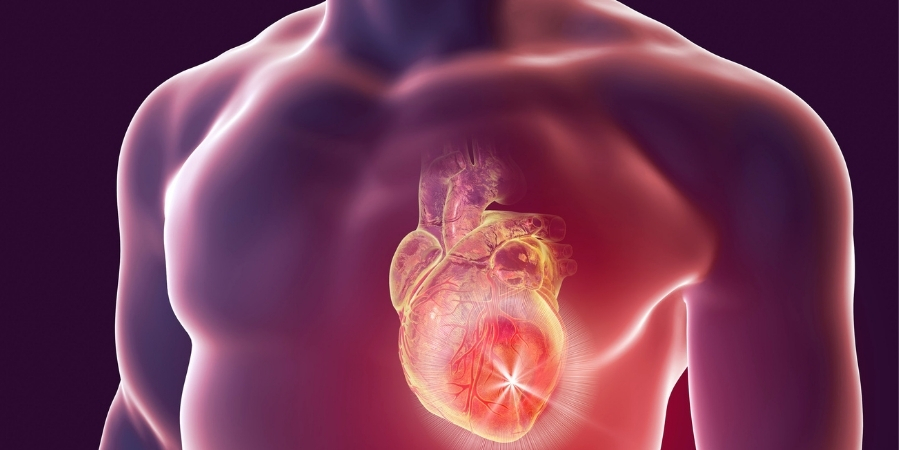Heart disease is a comprehensive term that involves many of the various types of heart problems. Heart disease, also known as cardiovascular disease, consists of the heart and blood vessels that come and go from the heart. Heart disease is what causes the most cases of death in the United States.
What Are the Leading Causes of Heart Disease?
The three leading causes of heart disease are high blood pressure, high levels of cholesterol in the blood, and smoking. Certain health conditions and lifestyle choices that can also lead to heart disease are being overweight or obese, having diabetes, having an unhealthy diet, being physically inactive, and drinking large amounts of alcohol.
At What Age Do Heart Problems Start?
Once an adult reaches the age of 45, cardiovascular health issues become more common. However, the number of young people who have had heart attacks has increased, and someone can be in their 20s or 30s and have a heart attack if they are genetically predisposed to heart health issues, are living quite an unhealthy lifestyle, and certain medical conditions that make it more likely to lead to a heart attack. Drug overdoses are another main reason why young people have heart attacks.
What Are the Worst Symptoms of Heart Disease?
There are multiple signs and symptoms that could be your body trying to say that you are going through heart disease. These include chest pain, shortness of breath, coughing or wheezing sounds, swelling in the legs, ankles, or feet, not having enough blood transported to the extremities, constantly feeling tired, and having a fast heart rate or heart palpitations. The chest pain would likely be located somewhere within the range of the neck to the upper abdominal region. The chest pain can be mild or severe, and your chest may feel like a heavy weight is on top of it or a burning, sharp sensation. Shortness of breath can occur while physically active or sitting/lying down. Signs of not receiving enough blood to the legs or lower can include:
- Muscle pain/tiredness/discomfort within the legs or feet.
- Feeling a sense of numbness.
- Feeling cool to the touch or having pale coloration within the same region.
One should be concerned about tiredness when one feels more tired than usual; tiredness impacts whether one completes daily activities or not and can happen very suddenly or make one feel very weak.

What Is Living with Heart Disease Like?
When someone is going through heart disease, It can cause them to feel fearful, anxious, highly stressed out, or depressed. Any symptom experienced can be questioned if it is a sign of heart problems, and the individual can worry whether making specific dietary or lifestyle changes will improve their health situation. If the individual feels like they are drowning and can see no way out, it is essential to find a means of support, whether a counselor, a support group, or friends and family. For anyone who is experiencing high amounts of anxiety or depression, a counselor might be the best option, as a treatment plan should be developed on how to manage these feelings. Finding a support group with others who are also going through heart disease can be a great option, as everyone can discuss what they have been experiencing and how they have been getting through it. Friends and family can also be there for you, to hear you out, or to help you find resources or solutions to assist with your heart disease.
How Can I Prevent Heart Disease?
Some of the best methods to go about preventing heart disease include:
- Quitting smoking and the use of tobacco products.
- Getting somewhere between thirty to sixty minutes of physical activity every day.
- Targeting heart-healthy foods.
- Getting enough sleep.
- Managing your stress levels.
- You should visit your health clinician frequently for screenings and tests to monitor heart health biomarkers.
There are chemicals within all tobacco products that cause harm to your heart and blood vessels by decreasing the amount of oxygen levels within the blood. Being physically active helps lower blood pressure, reduce cholesterol levels, and decrease the risk of being diagnosed with type 2 diabetes. Heart-healthy foods include:
- Fresh fruits and vegetables.
- Legumes.
- Lean forms of meat and fish.
- Low-fat/fat-free dairy products.
- Whole grains.
- Fats high in omega-3s like avocadoes and olive oil.
Ideally, one should get seven hours of sleep each night. Mindfulness exercises, yoga, or meditation can help with stress management.
Choosing a healthy plant-based and vegan diet is most beneficial when it comes to:
-
Higher levels of energy;
-
Improved sleep;
-
Aids in energy and overall happiness;
-
Provides a sense of comfort and relief;
-
Could prevent major diseases such as obesity and diabetes;
-
Accomplish weight-loss and management; and
-
Improves mental and cognitive functioning.
References
Icahn School of Medicine at Mount Sinai. (n.d.). Warning signs and symptoms of heart disease. Mount Sinai.
Mayo Clinic Staff. (2023, August 17). Strategies to prevent heart disease. Mayo Clinic.
National Heart, Lung, and Blood Institute. (2023, December 20). Living with coronary heart disease. NIH.
National Heart, Lung, and Blood Institute. (n.d.). Heart diseases. MedlinePlus.


















